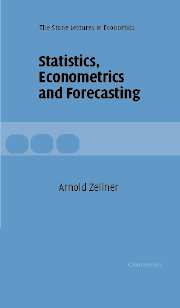Appendix: On the questionable virtue of aggregation
Published online by Cambridge University Press: 22 September 2009
Summary
In a brilliant and provocative article entitled “Is aggregation necessarily bad?” Y. Grunfeld and Z. Griliches present some calculations that they interpret as supporting the position that aggregation is not necessarily bad. As R. Solow points out, such a position runs counter to “one of the deep-seated prejudices of the economics profession – the belief in disaggregation.” But, even so, Solow – while calling for more evidence and recognizing the intricacies of the problem – cites the Grunfeld-Griliches paper approvingly.
Of course, the belief in disaggregation is more than a prejudice on the part of the economics profession. As Orcutt and Rivlin state, “That microeconomic data contain more information than the same data aggregated is obvious. In general, one might expect some of this extra information to be useful for purposes of testing and prediction.” Further, the results of Theil on aggregation bias, even though limited to linear aggregation (where one might think that the aggregation problem would be least bothersome), cannot be anything but disturbing to those who rely solely on estimated macro-relationships. In fact, Grunfeld and Griliches (GG) devote a considerable portion of their paper to an attempt to explain why it is that one of Theil's theorems is contradicted by their empirical findings.
Given this extremely important issue of micro-versus macro-analysis – one that has, among other things, vital implications for the direction of economic research – it seems worthwhile to present an explanation of GG's empirical results, which apparently indicate that, in two instances, macro-relations have greater explanatory power than do the micro-relations underlying these macro-relations.
- Type
- Chapter
- Information
- Statistics, Econometrics and Forecasting , pp. 125 - 129Publisher: Cambridge University PressPrint publication year: 2004
- 1
- Cited by



